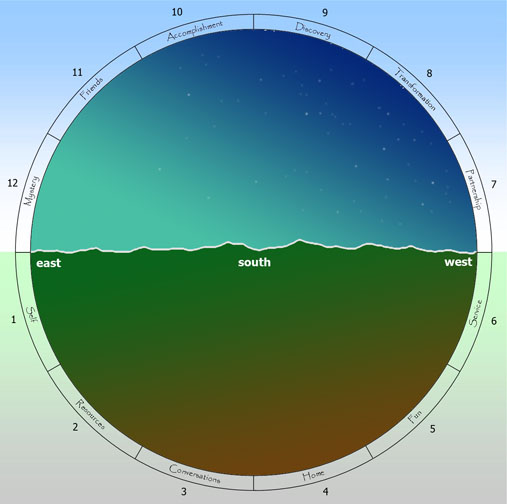|
Astrological
Houses
Imagine yourself to be an
astrologer of long ago. A child has just been born
to the royal family, and you are asked to read the
child’s nature and fate from the stars. You
stand outside, looking toward the east, where the
Sun, Moon, and planets rise each day. One by one,
you watch the signs of the zodiac appear over the
eastern horizon and rise overhead. You note the
planets when they appear, and any other portents
the sky provides. If you stood there for an entire
day (and if you could see the stars during the
daylit hours), you would have seen the entire sky
rise and circle overhead, and you would be looking
once again at the same stars you saw the day
before, when the child was born.
This imaginary exercise is a
good starting place for appreciating what
astrological houses are about. The circle of the
sky is divided into twelve segments, each of which,
by tradition, applies to certain areas of life. The
first of these segments, which our imaginary
astrologer would encounter in the first hours after
the child’s birth, gazing east, is the most
potent, as it shows how the person presents
themselves to the world, the things that will most
visibly distinguish this life from any other. The
second segment, which would appear to our
astrologer a couple hours later, shows what
resources the child will have to draw on, to make a
way in the world. And so it goes, around the circle
of the sky.
These segments are called
houses. Depending on the time and place of birth, a
house may contain any of the planets, and any sign
of the zodiac. The planets and signs seen in each
house show us what energies are active in that area
of a person’s life.

In classical astrology, each
house had a Latin name that indicated, quite
clearly, what it was about. The first house was
vita (life), the second lucre
(wealth), the third fratres (siblings), and
so on. If you wanted to know if a person would be
wealthy, you would find the answer in what planets
and signs were in the house of wealth.
Today, we mostly refer to
the houses by number, which makes them seem more
mysterious and strains the memories of new students
of astrology. I like to refer to them by names,
although some of the old names need a little
updating to fit into our modern categories. Here
are the house names I like to use:
1. Self
2. Resources
3. Conversations
4. Home
5. Fun
6. Service
7. Partnership
8. Transformation
9. Discovery
10.
Accomplishment
11. Friends
12. Mystery
There is a modern tendency
to blend the meanings of the houses with the
meanings of the signs, which I think is
unfortunate. The signs are the ways in which we
express our life energies. The houses, on the other
hand, are the areas of life, the particular
activities we engage in. Remember the game Clue? To
solve the mystery, you needed three pieces of
information: the name of the murderer, the murder
weapon, and the room of the house where the murder
took place: Colonel Mustard with the rope in the
conservatory. Who, how, where. Astrology works very
much the same way: the planets say who (what basic
energy is expressing itself), the signs say how
(what flavor or way of operating that energy takes
on), and the houses say where (what part of my life
I can expect to see that energy working
in).
Now, there are certainly
some “natural” connections or harmonies
between the planets, signs, and houses. Venus is
the energy of attraction. If Venus is in Libra, we
express attraction harmoniously and diplomatically,
which seems a dandy combination - much easier than
trying to express our competitive energies
harmoniously, or trying to express attraction
through diligence and dedication, for example. And,
if that Venus in Libra is also in the seventh
house, the House of Partnership, we will be
expressing attraction harmoniously in our marriage
or other close relationship, which one would expect
to be a good recipe. But if that Venus in Libra
happened to be in my ninth house instead, the House
of Discovery, I would expect to see this
harmonious, diplomatic, energy of attraction come
out most clearly when I was traveling, learning new
things, or following spiritual or intellectual
pursuits. I might find that my happiest
interactions with people are with my teachers or
fellow travelers, rather than with a mate or
partner.
When people run the houses
and signs together in their understanding, they
lose this important difference between the how and
the where of planetary influences.
Incidentally, it is largely
for the sake of the houses that astrologers are so
intent on knowing one’s exact time of birth.
The planets move through the signs of the zodiac
over the course of weeks, months, or even years.
But the houses spin by with each passing hour. A
half hour, which doesn’t seem like much, can
make the difference between whether you find your
true calling in life in the House of Fun or in the
House of Service!
Next Steps
The last lesson in this
little crash course on astrology is about aspects,
which is astrological language for how the
different planets get along with each
other.
Go to Page
Five.
|